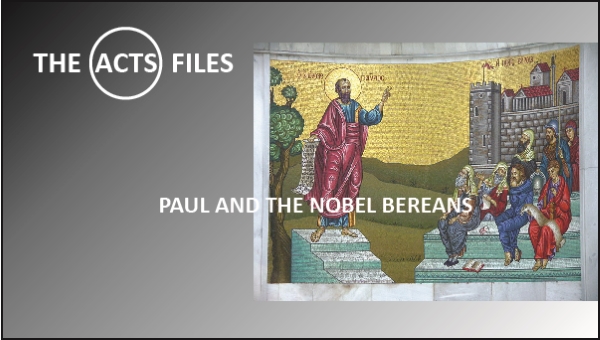By Tyson Thorne

Once more in fear of mortal danger Paul, Silas and Timothy set out at night to the city of Berea (Acts 17.10-15). No doubt other’s accompanied them as well, as traveling at night was very dangerous. Upon their arrival Paul continued his pattern and first went to the city’s synagogue to teach the Jews about the Messiah. Paul had not yet found a new method for reaching the Europeans. The church is Thessalonica was mostly made of Gentiles (1 Thessalonians 1.9) and this would likely continue as he pushed farther from Jerusalem. What he found in Berea was surprising.
Paul found the people of this lesser city to be more open to his message than in any previous city. Most modern translations describe the city inhabitants as “open-minded” or “fair-minded” (verse 11) but the Greek describes the men of the city as “noble”. The Greek word is a variant of the one used to describe the “prominent women” of verse 12. The change in translation is meant to clarify the situation Paul faced, as the men were not royalty as may be implied by the English rendering “noblemen”. While the modern interpretation is more in keeping with Luke’s probable intent, it does not keep the flare of Luke’s writing and merits mention.
It should be pointed out that while the men were more open-minded than the Jews Paul had contact with previously, this does not imply that they were liberal or simple-minded. Indeed, Luke emphasizes that these men carefully checked everything Paul said against the Torah to verify the accuracy and likelihood of Paul’s teaching. These scholarly men could find no fault in anything Paul presented and many believed. The same is said for the prominent, or “respected” Gentile women. The bliss Paul and his companions found themselves in was not to last, however. Tensions again rose when synagogue rabbi’s from Thessalonica caught up to the trio in Berea and began to stir up trouble for the missionaries and especially for Paul.
Paul had been thinking about his European campaign for several weeks and trying to find a way to overcome the difference in cultural climate. Without the historical roots of Judaism, few could be found to lead the fledgling churches. There was no one qualified to be an elder in these churches. It is likely that for this reason Paul left Silas and Timothy in Berea, that they might continue the work of establishing the church there while he fled to Athens.
Since there is no mention of a ship, Paul probably made this journey over land, some 340 miles. After settling in Paul’s escort may have been the same men who helped him flee from Thessalonica. If so, they returned to that great city but stopped in Berea to deliver the message that Silas and Timothy were now to join Paul in Athens.
|
|
|
